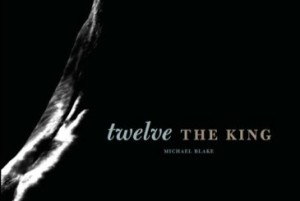I encountered an animal whose being was saturated with evidence that the Mystery’s spirit was on earth.
— Michael Blake
During the mid-1800s, more than two million wild horses freely roamed America’s west. But, cattle ranchers — who had already seized land from the Indians and were in a land war with farmers and shepherds — saw horses as competition for unfenced grazing land. Aided by corporate interests and an unconcerned public, ranchers poisoned the water holes, shot the horses, or ran them over cliffs. It was legal.

Twelve: The King
By Michael Blake
Publisher: Perceval Press
Santa Monica, CA
ISBN: 978-09819747-2-9
Price: $14 soft cover
During the remainder of the 19th and the first half of the 20th centuries, millions would be killed or sent to slaughter houses in Mexico to become dog food — or gourmet meats to be served in the finer European restaurants.
A national campaign begun in the 1950s by Velma Johnston led Congress and the Nixon Administration in 1971 to give protection to the remaining horses and burros. By then, there were only about 60,000 left in 10 states. Three decades later, under the George W. Bush Administration, the Bureau of Land Management determined that even those wild horses and burros were too many. Congress and the Administration, still influenced by corporate interests, repealed most of the 1971 law. Apparently, the remaining 20,000 horses were taking up too much space and resources from the four million head of cattle. The BLM plan was to round up the “excess horses” and place them in federal corrals.
But, where the BLM placed the horses wasn’t corrals but concentration camps, according to Michael Blake, author of Dances With Wolves. Blake’s latest book, Twelve: The King, is a moving story of his love for wild horses, especially one, a black gelding with the number “1202” branded onto his left flank. Blake describes the first time he saw Twelve:
When [he] came into full view, everyone eyed his approach; it was as if we had all been tranquilized. He was floating down the pathway, his feet touching the ground as if it were a thick cloud … He came into the pen—it seemed as if he levitated in—and for a minute everyone just stared at him. Even the restless children watched him. He was something from another time or place.
For more than two decades, Twelve had been the leader, the protector, of a herd of wild horses. Now, in 1991, he was confined to a small pen on federal land in Palomino Valley, Nevada, about 30 miles north of Reno. “There seemed to be an invisible barrier surrounding him, and none of the other horses, whether alone or in gangs, ever sniffed or touched or whinnied at him,” Blake writes, condensing the recollection of a government worker that once, “the entire population came together and circled their king in a massive surround that lasted several minutes.”
The BLM claimed Twelve was unadoptable because of his age and fiery independence. Blake saw something else. And so he paid $120 to adopt the unadoptable horse, one who wouldn’t associate with Blake’s domestic horses yet watch over them and be their protector. There was no way Blake would tame Twelve, not in their home near Los Angeles, nor at Wolf House, which became their home near Tucson. But with love and mutual respect, they would be companions for more than 15 years.
Twelve is the story of that love, that companionship, the story of a writer and a horse, each of whom values not just the spirit of independence but also the land and all that live upon it. There are no flowery phrases, no sentimental dribble, no violent outbursts at mankind and the government, just simple declarative sentences that carry within them the power of love and life. Although it may have seemed that Blake was Twelve’s protector, rescuing him from a government concentration camp, the truth is that Twelve, as he was for so many wild horses, was probably Blake’s protector, a constant in a life that itself underwent so much turmoil.
Twelve died Sept. 7, 2005. Michael Blake visits his grave almost every day, “driven not so much by grief as a sense of honor.”
The beauty and quality of production of the Perceval Press book, something not often seen in contemporary book publishing, complements Blake’s words and photos to make Twelve a powerful statement by one of America’s best writers about the value of life and the environment.










